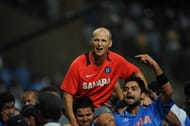Coaches in international cricket play an absolutely essential role in modern times, so much so that every team not just has a head coach overseeing proceedings, but also a batting, bowling and fielding coach in order to take care of the separate departments. With that being the case, it is quite astonishing that cricket coaches for the elite level were only considered fundamental from the late 1980s onwards. There might have been occasions, during the 1970s and earlier, where there were people present with international teams in order to help in going about cricketing matters but only on a part-time basis. The whole thinking towards coaches in international cricket has changed for the better, in my opinion, in the last 2 decades or so.That brings me to what are the qualities that an international coach must possess in order to be successful. While there are no set norms as such that a coach adhering to will enable guaranteed success, there are certain attributes which a coach having will be of tremendous help and make the job a whole lot easier.Here are five requisite qualities for a coach to be successful:
#1 Avoiding the spotlight

It is imperative for coaches, I believe, to stay in the background and go about their business quietly rather than seeking attention onto themselves. It is the players, after all, that have to perform on the field, and coaches would do well to ensure that the focus remains on the players.
This is where Gary Kirsten was spot on during his time as Indian coach from 2008 to 2011. The Indian players often spoke about Kirsten having excellent inputs as coach and rated him as one of the best they had ever worked with, but never did the South African, despite the numerous plaudits coming his way, pat himself on the back and claim any credit for the work that he had done, displaying his humility along the way.
#2 Understanding team culture

Understanding the culture of the team you are working with is one of the paramount aspects of being a successful coach. Each country has a different culture and way of doing things, and it is important for the coach to realise that quickly and look to adapt to the team surroundings rather than expecting the whole team to conform to his method of working.
Greg Chappell is a prime example of a coach not absorbing the culture prevailing in the team - India in his case - and as a result, his time with the Indian team was always going to end in agony. Without a doubt, he had a lot of virtues as a coach and his technical nous was second to none. But his inclination to challenge the authority of senior Indian players of the stature of Sourav Ganguly and Sachin Tendulkar, who are revered in the Indian dressing room and by the public, was foolhardy and showed his ignorance of the Indian team dynamics.
#3 Good man management skills

Man management skills in a sporting sense constitute the ability to know how to deal with each individual player and, in turn, how to get the best out of them. Each individual is obviously different, and a coach needs to ensure that he sends out the right advice to each member depending on their personality. There are certain players in every team who like to be loved and treated with special care, and if the coach recognizes that those players possess the ability to win cricket matches single-handedly, there is nothing wrong with him cajoling those players and feeding their ego once in a while.
#4 Should be devoid of ego

When you are dealing with international players who have very big egos themselves, it is important for coaches to leave their ego behind them and play second fiddle to the players. That is, of course, easier said than done because many international coaches have themselves played at the very highest level before entering the field of coaching.
There is also no room for personal equations to come in the way when you are in-charge of a team. As a coach, you might not like certain players but cannot discard them because of it and need to recognize that the team’s interest is paramount.
I think it would be fair to say that towards the end of Andy Flower’s reign as England coach, he was almost fighting a personal battle with Kevin Pietersen and wanted him out of the team at any cost because of their past history, much to the detriment of the team. Although Flower would argue that England haven’t done too badly since Pietersen’s sacking in February last year, there is little doubt that they are worse off in Pietersen’s absence.
#5 International playing experience

While it is not an absolute must for coaches to have played international cricket considering the fact that many people who haven’t played for their country have done very well in the coaching arena, most notably John Buchanan, I think appointing coaches with at least a decent amount of international playing experience would be beneficiary nonetheless. After all, a coach who has played at the international level will have a better idea of the challenges that confront a cricketer at the top level and can impart advice on how to overcome those challenges, presumably having done so himself.
The players also tend to absorb and respect opinions of former international players-turned-coaches much more than they would do of coaches who have not played beyond a certain stage. Another benefit is that they tend to have first-hand information about the subtleties of playing conditions in different countries and can be a sounding board to their team in such matters.
Follow IPL Auction 2025 Live Updates, News & Biddings at Sportskeeda. Get the fastest updates on Mega-Auction and cricket news
